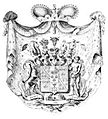
Klemens von Metternich
Klemens Wenzel Nepomuk Lothar, Prince of Metternich-Winneburg zu Beilstein[nb 1] (15 May 1773 – 11 June 1859),[1] known as Klemens von Metternich (German: [ˈkleːmens fɔn ˈmɛtɐniç]) or Prince Metternich, was a conservative Austrian statesman and diplomat who was at the center of the European balance of power known as the Concert of Europe for three decades as the Austrian Empire's foreign minister from 1809 and Chancellor from 1821 until the liberal Revolutions of 1848 forced his resignation.
"Metternich" redirects here. For other people, see House of Metternich and Metternich (name).
Klemens von MetternichPrince of Metternich-Winneburg zu Beilstein
Office established
Franz Anton as Minister-President
15 May 1773
Koblenz, Electorate of Trier, Holy Roman Empire
11 June 1859 (aged 86)
Vienna, Austrian Empire
German Austrian
-
Princess Eleonore von Kaunitz(m. 1795; died 1825)
-
Baroness Antoinette von Leykam(m. 1827; died 1829)
-
Countess Melanie Zichy-Ferraris(m. 1831; died 1854)
- Franz Georg Karl, Count of Metternich-Winneburg
- Countess Beatrix von Kageneck
The Congress of Vienna, minister of state, conservatism, Concert of Europe
Born into the House of Metternich in 1773 as the son of a diplomat, Metternich received a good education at the universities of Strasbourg and Mainz. Metternich rose through key diplomatic posts, including ambassadorial roles in the Kingdom of Saxony, the Kingdom of Prussia, and especially Napoleonic France. One of his first assignments as Foreign Minister was to engineer a détente with France that included the marriage of Napoleon to the Austrian archduchess Marie Louise. Soon after, he engineered Austria's entry into the War of the Sixth Coalition on the Allied side, signed the Treaty of Fontainebleau that sent Napoleon into exile and led the Austrian delegation at the Congress of Vienna that divided post-Napoleonic Europe amongst the major powers. For his service to the Austrian Empire, he was given the title of Prince in October 1813.
Under his guidance, the "Metternich system" of international congresses continued for another decade as Austria aligned itself with Russia and to a lesser extent Prussia. This marked the high point of Austria's diplomatic importance and thereafter Metternich slowly slipped into the periphery of international diplomacy. At home, Metternich held the post of Chancellor of State from 1821 until 1848 under both Francis I and his son Ferdinand I. After a brief exile in London, Brighton, and Brussels that lasted until 1851, he returned to the Viennese court, only this time to offer advice to Ferdinand's successor, Franz Josef. Having outlived his generation of politicians, Metternich died at the age of 86 in 1859.
A traditional conservative, Metternich was keen to maintain the balance of power, particularly by resisting Russian territorial ambitions in Central Europe and the Ottoman Empire. He disliked liberalism and strove to prevent the breakup of the Austrian Empire, for example, by crushing nationalist revolts in Austrian northern Italy. At home, he pursued a similar policy, using censorship and a wide-ranging spy network to suppress unrest.[2]
Metternich has been both praised and heavily criticized for the policies he pursued. His supporters pointed out that he presided over the "Austrian system" when international diplomacy helped prevent major wars in Europe. His qualities as a diplomat were commended, some noting that his achievements were considerable in light of the weakness of his negotiating position. Meanwhile, his detractors argued that he could have done much to secure Austria's future, and he was deemed a stumbling block to reforms in Austria. Metternich was also a supporter of the arts, taking a particular interest in music; he knew some of the most eminent composers in Europe at the time including Haydn, Beethoven, Rossini, Liszt, and Strauss.
Ambassador[edit]
Dresden and Berlin[edit]
The Holy Roman Empire's defeat in the War of the Second Coalition shook up diplomatic circles, and the promising Metternich was now offered a choice between three ministerial positions: to the Imperial Diet at Regensburg; to the Kingdom of Denmark at Copenhagen; or to the Electorate of Saxony at Dresden. He chose Dresden in late January 1801, and his appointment was officially announced in February. Metternich summered in Vienna, where he wrote his "Instructions", a memorandum showing a much greater understanding of statesmanship than his earlier writing. He visited the Königswart estate in the autumn before taking up his new position on 4 November.[16] The subtleties of the memorandum were lost on the Saxon court, which was headed by the retiring Frederick Augustus I, a man with little political initiative. Despite the boredom of the court, Metternich enjoyed the light-hearted frivolity of the city and took up a mistress, Princess Katharina Bagration-Mukhranska, who bore him a daughter, Marie-Clementine. In January 1803 Metternich and his wife had a child whom they named Viktor.[16] In Dresden Metternich also made a number of important contacts including Friedrich Gentz,[17] a publicist who would serve Metternich as both confidant and critic for the next thirty years. He also established links with important Polish and French political figures.[18]
Foreign Minister[edit]
Détente with France[edit]
Now back in Austria, Metternich witnessed first hand the Austrian army's defeat at the Battle of Wagram in 1809. Stadion tendered his resignation as Foreign Minister in the aftermath, and the emperor immediately offered the post to Metternich. Metternich, worried that Napoleon would seize on this to demand harsher peace terms, instead agreed to become a minister of state (which he did on 8 July) and to lead negotiations with the French on the understanding that he would replace Stadion as Foreign Minister at a later date.[26] During peace talks at Altenburg, Metternich put forward pro-French proposals to save the Austrian monarchy. Napoleon, however, disliked his position on the future of Poland, and Metternich was gradually displaced from the proceedings by Prince Liechtenstein. He soon regained influence, however, on 8 October, as Foreign Minister (and additionally that of Minister of the Imperial Household).[26] In early 1810 Metternich's earlier affair with Junot became public but, because of Eleonore's understanding, the scandal was minimal.[27]


